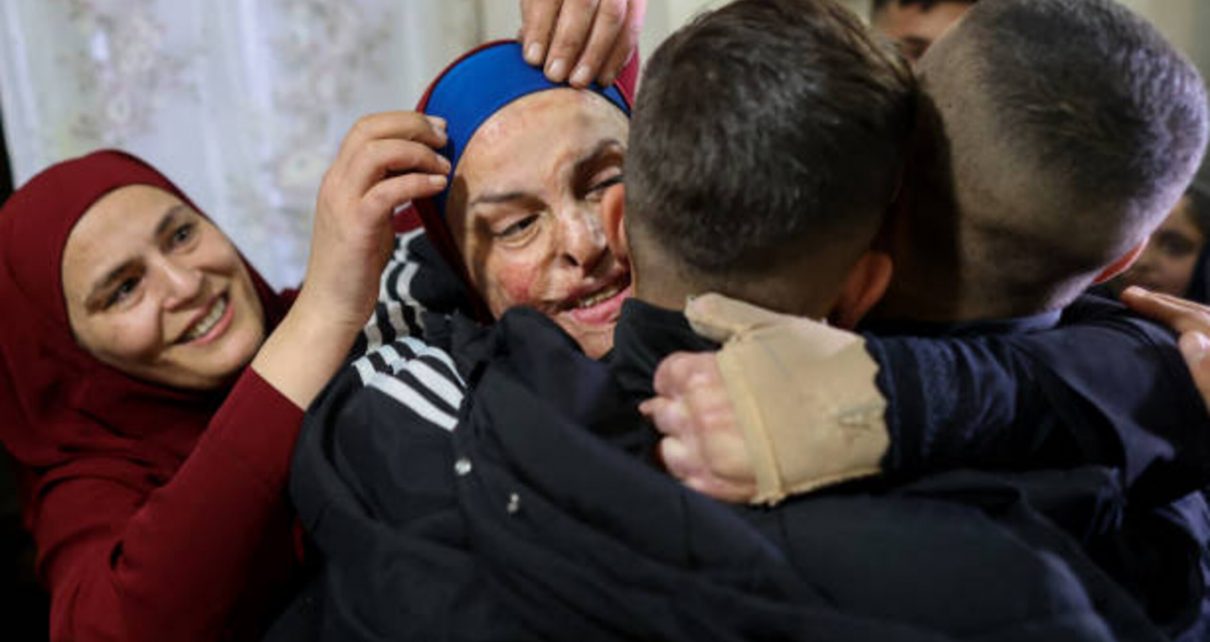A second group of Israeli hostages left Hamas captivity on Saturday after hours of delay had increased the anxiety of desperate families.
The Israeli military said 13 Israelis were released in Gaza and in exchange, 39 more Palestinian prisoners were released by Israel in the West Bank. Hamas also released four Thai hostages.
The first releases took place smoothly on Friday, under a temporary four-day truce deal brokered by Qatar.
Urgent talks saved Saturday’s handover.
The Israelis had been expected to be handed over to the Red Cross on Gaza’s border with Egypt at 16:00 (14:00 GMT).
The Hamas armed wing, the Qassam Brigades, said there were issues over the delivery of aid to northern Gaza and the selection criteria for Palestinian prisoners being exchanged for captives held by Hamas. Israel denied violating the terms of the deal.
Hamas spokesman Osama Hamdan said a total of 340 aid trucks had gone into Gaza since Friday, but only 65 had reached northern Gaza – which he said was less than half of what Israel had agreed on. Israel describes the north as a war zone and says the UN is responsible for delivering the aid.
Later a senior Palestinian official close to the talks confirmed Qatar’s statement that the dispute had been resolved.
And Hamas voiced “appreciation towards Egypt and Qatar for ensuring the continuation of their temporary truce with Israel”.
Under the deal, 50 Israeli hostages – women and children – are to be freed by Hamas over four days, in exchange for 150 Palestinian prisoners.
The Israeli government says the truce could be extended if at least 10 Israelis are released daily – but it has also vowed to wipe out Hamas and insists the deal is only temporary.
Hamas kidnapped about 240 people when it raided southern Israel on 7 October, and killed 1,200, most of them civilians, Israel says.
The Islamist Iran-backed group is categorised as “terrorist” by Israel, the UK and US.
In retaliation for the 7 October attack Israel has bombed Gaza relentlessly, wrecking its infrastructure.
Hamas says nearly 15,000 people have died, including many children. Large supplies of aid – notably food, water and hygiene kits – are desperately needed.
Released Palestinian prisoners were jubilant in the occupied West Bank on Friday
On Saturday evening some 50,000 people rallied in central Tel Aviv with the slogan “Bring them back home” on posters and t-shirts, hoping that the fragile truce would hold.
The Israeli government said Saturday’s handover freed two teenage members of the Or family; two members of the Weiss family (53 and 18); two members of the Avigdori family (52 and 12) and four members of the Haran and Shoham families, including a three-year-old and eight-year-old. The other three released included Irish-Israeli Emily Hand, aged nine.
Before the Gaza release took place Noam Sagi, son of 75-year-old hostage Ada Sagi, told the BBC: “we’re still waiting for tonight’s list to be released; it’s torture, the whole family are waiting and biting their nails to see if she’s on the list”.
He said “we need to see the mechanism is getting into shape, [that] every day there is a release, the ceasefire is being held”. But he added “of course there is very little trust on both sides”. Ada Sagi was not among those freed on Saturday.
The joy of families reunited after Friday’s releases was tempered by longing for the other hostages still held.
A relative of the reunited Munder family, Shahar Mor, said “it’s a mixed emotion and moment because also my Uncle Abraham is still there and we don’t have any information about his well-being”.
Most of the 39 Palestinians released by Israel on Friday – 24 women and 15 teenage boys – were in pre-trial detention. One of them, Sarah al-Suwaisa, said the Israelis had fired teargas and cut off the prisoners’ electricity before the release. She called it “humiliating, psychological torture” and said “only Hamas helped us”.
A crowd gathered again in Beitunia on Saturday to receive more released Palestinians – women and teenagers who were held at Ofer prison. Many green Hamas flags were displayed there, the BBC’s Lucy Williamson reports. (BBC)


